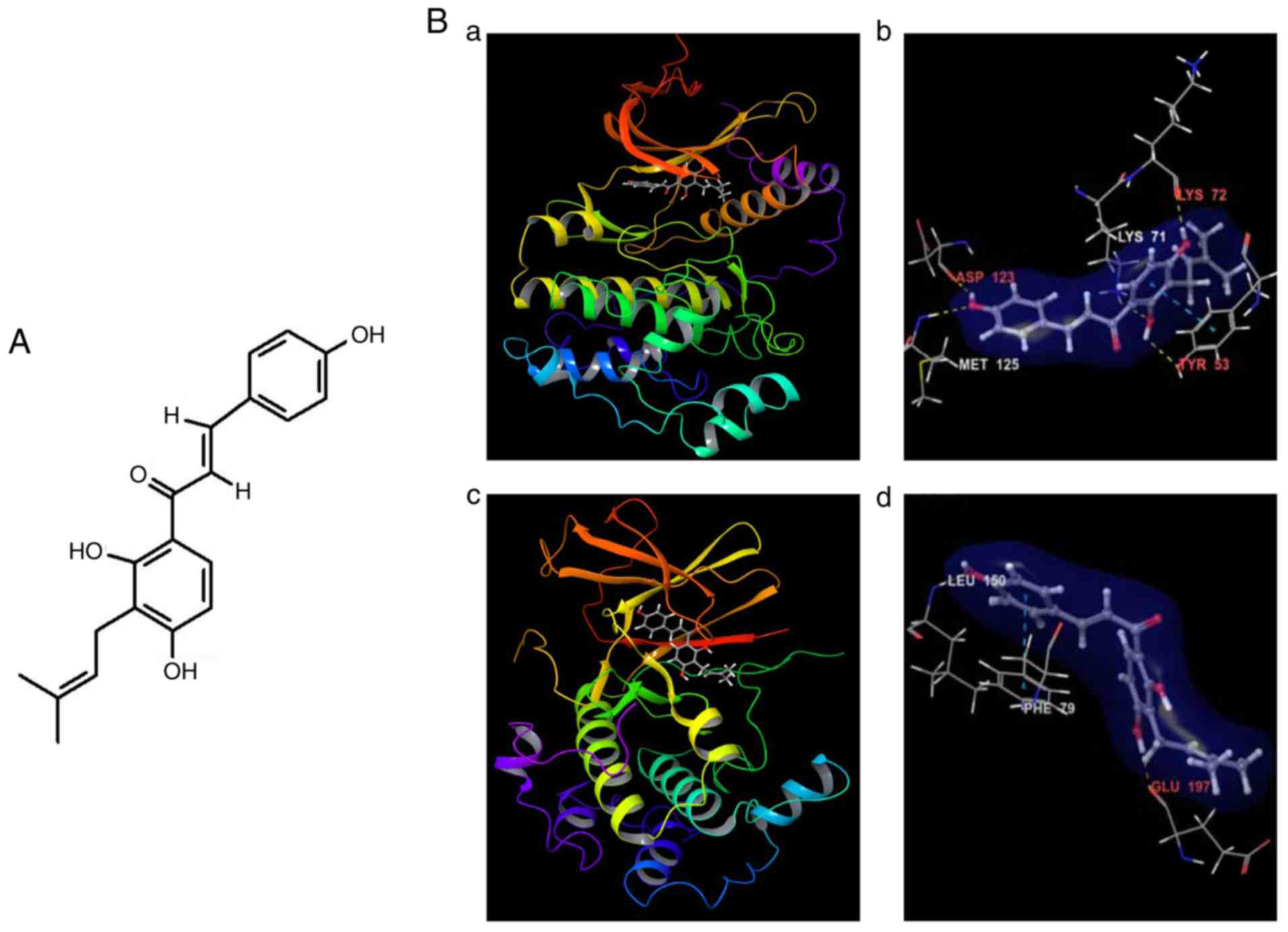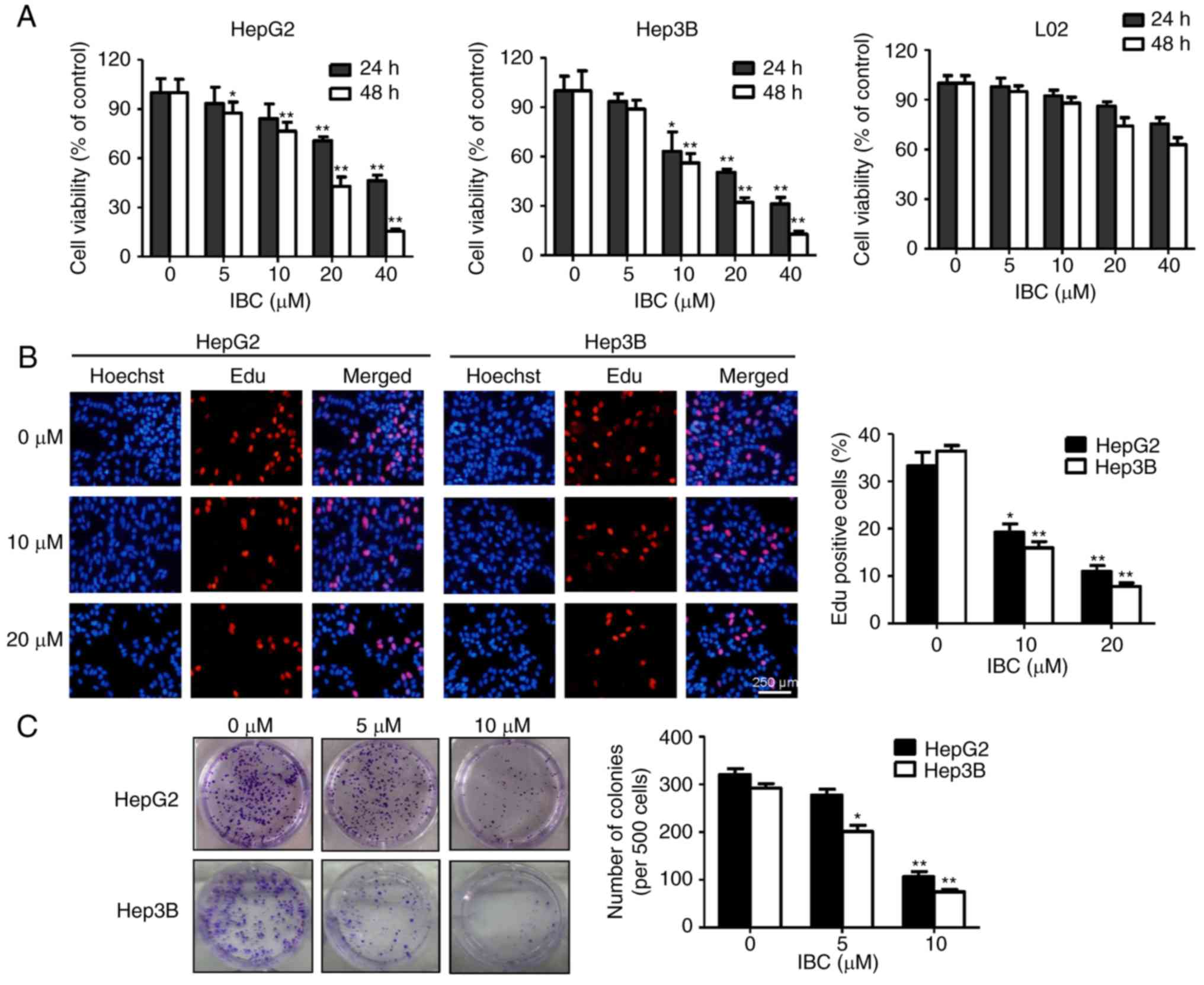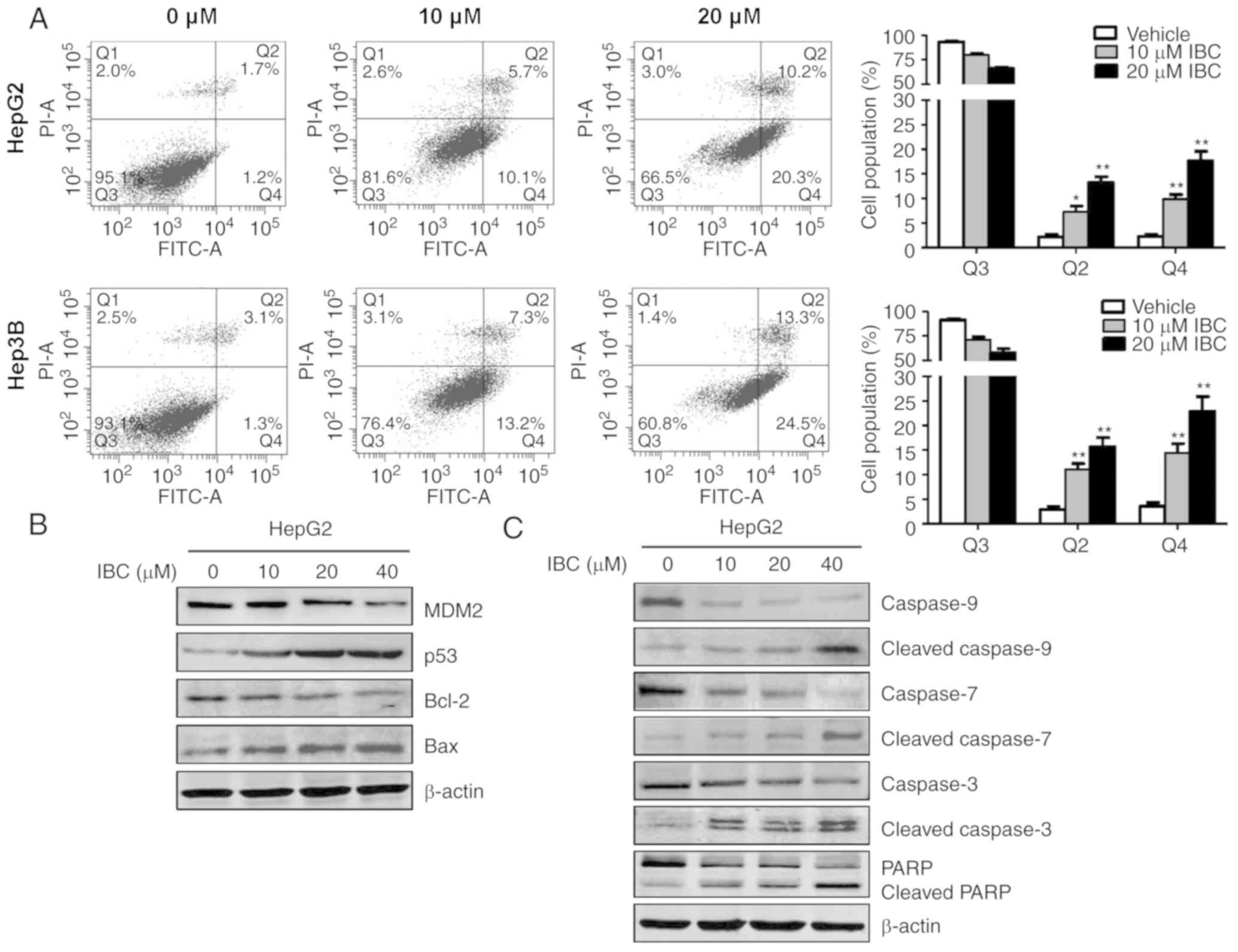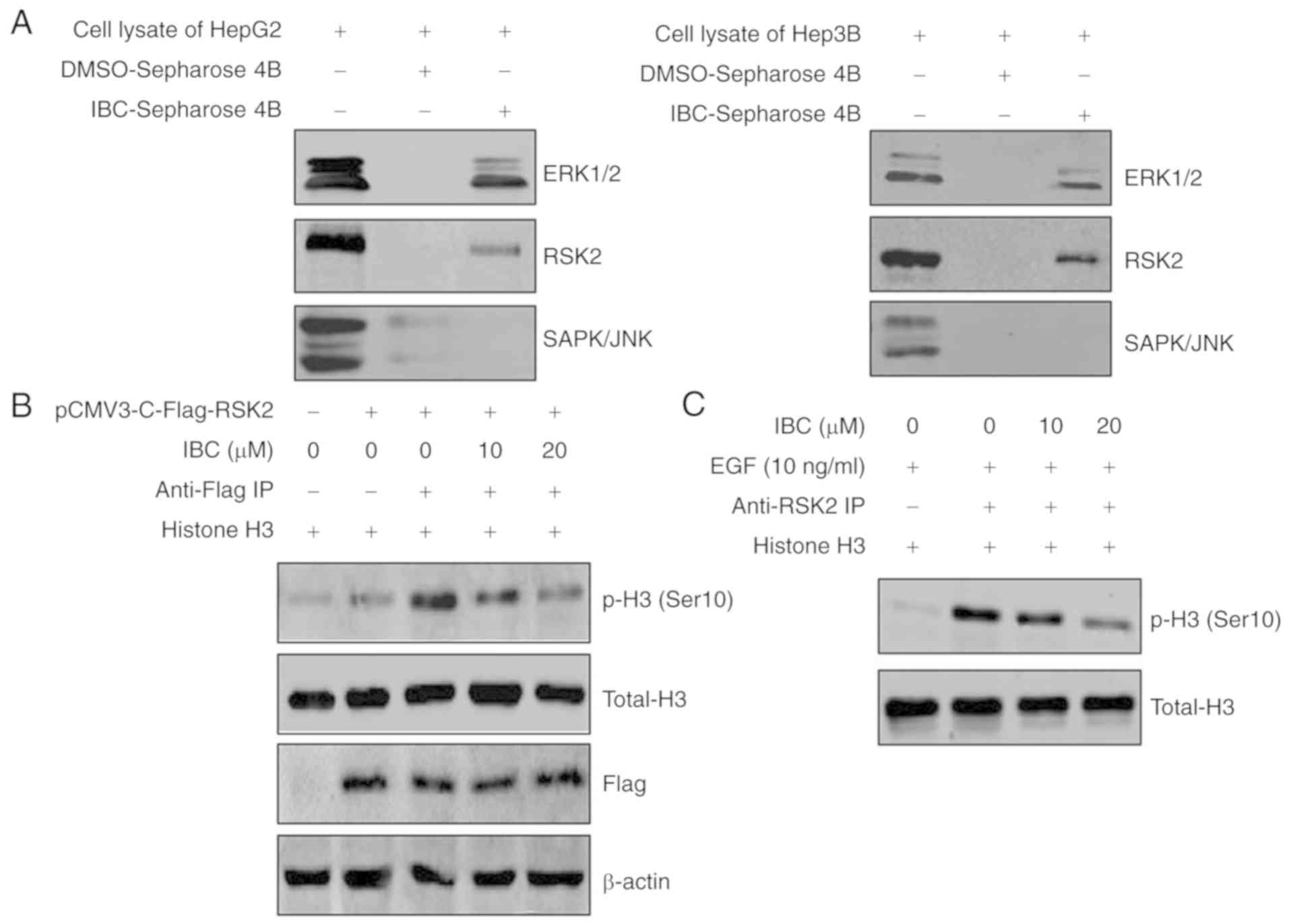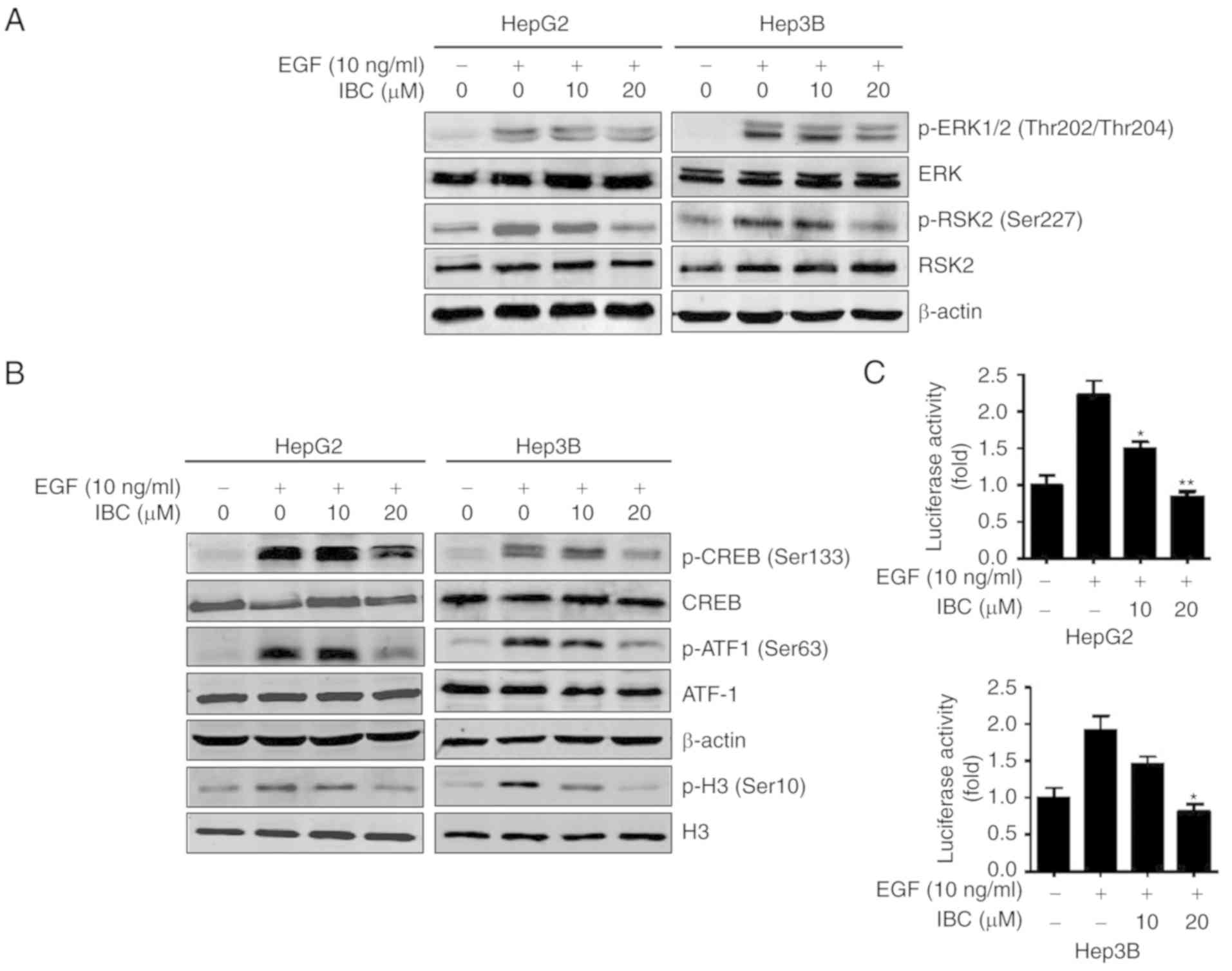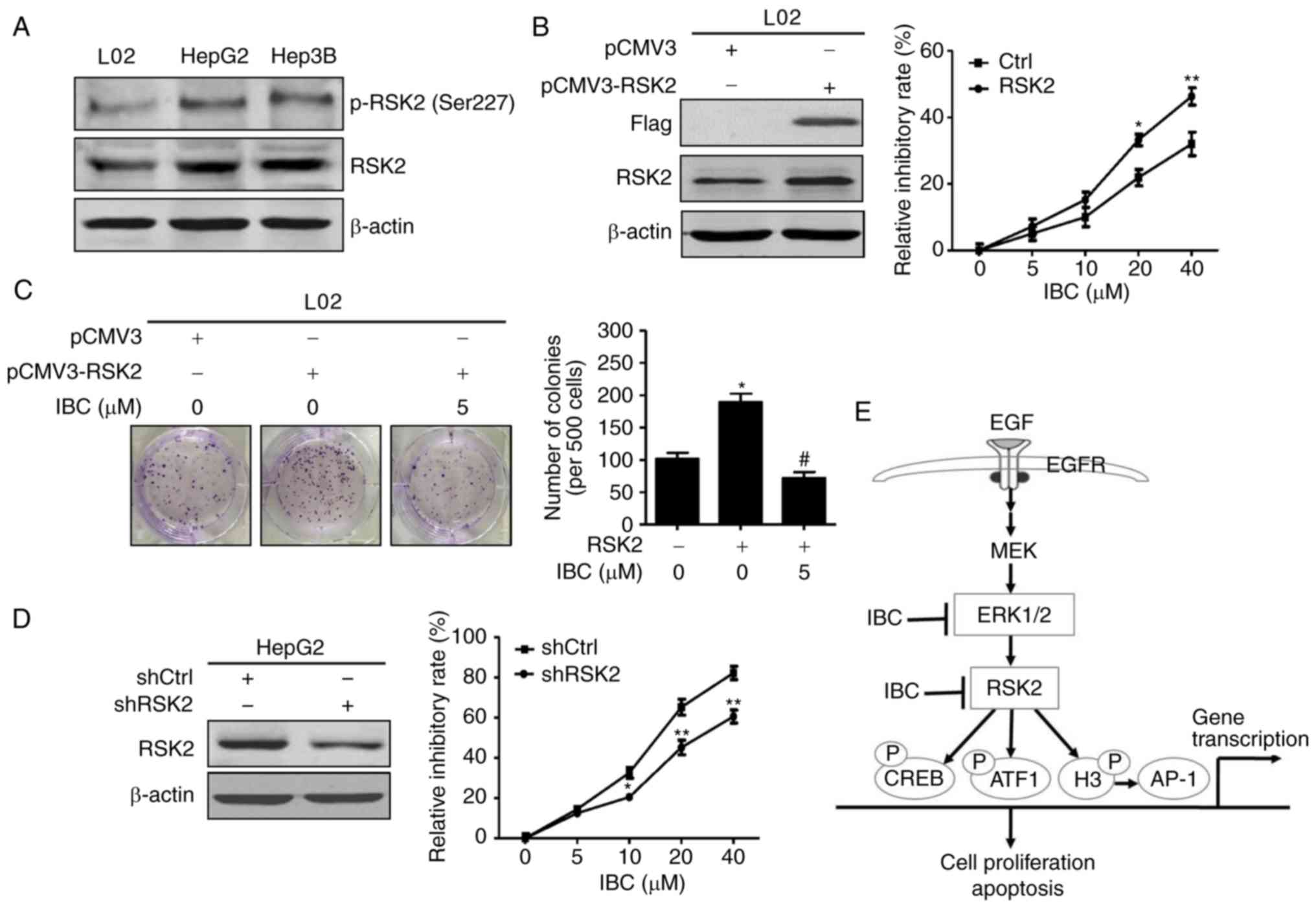|
1
|
Bray F, Ferlay J, Soerjomataram I, Siegel
RL, Torre LA and Jemal A: Global cancer statistics 2018: GLOBOCAN
estimates of incidence and mortality worldwide for 36 cancers in
185 countries. CA Cancer J Clin. 68:394–424. 2018. View Article : Google Scholar : PubMed/NCBI
|
|
2
|
Kumar M, Zhao X and Wang XW: Molecular
carcinogenesis of hepatocellular carcinoma and intrahepatic
cholangiocarcinoma: One step closer to personalized medicine? Cell
Biosci. 1:52011. View Article : Google Scholar : PubMed/NCBI
|
|
3
|
Santarpia L, Lippman SM and El-Naggar AK:
Targeting the MAPK-RAS-RAF signaling pathway in cancer therapy.
Expert Opin Ther Targets. 16:103–119. 2012. View Article : Google Scholar : PubMed/NCBI
|
|
4
|
Yip-Schneider MT, Klein PJ, Wentz SC, Zeni
A, Menze A and Schmidt CM: Resistance to mitogen-activated protein
kinase kinase (MEK) inhibitors correlates with up-regulation of the
MEK/extracellular signal-regulated kinase pathway in hepatocellular
carcinoma cells. J Pharmacol Exp Ther. 329:1063–1070. 2009.
View Article : Google Scholar : PubMed/NCBI
|
|
5
|
Yang S and Liu G: Targeting the
Ras/Raf/MEK/ERK pathway in hepatocellular carcinoma. Oncol Lett.
13:1041–1047. 2017. View Article : Google Scholar : PubMed/NCBI
|
|
6
|
Hsu CH, Shen YC, Shao YY, Hsu C and Cheng
AL: Sorafenib in advanced hepatocellular carcinoma: Current status
and future perspectives. J Hepatocell Carcinoma. 1:85–99.
2014.PubMed/NCBI
|
|
7
|
Lim HY, Heo J, Choi HJ, Lin CY, Yoon JH,
Hsu C, Rau KM, Poon RT, Yeo W, Park JW, et al: A phase II study of
the efficacy and safety of the combination therapy of the MEK
inhibitor refametinib (BAY 86-9766) plus sorafenib for Asian
patients with unresectable hepatocellular carcinoma. Clin Cancer
Res. 20:5976–5985. 2014. View Article : Google Scholar : PubMed/NCBI
|
|
8
|
Roberts PJ and Der CJ: Targeting the
Raf-MEK-ERK mitogen-activated protein kinase cascade for the
treatment of cancer. Oncogene. 26:3291–3310. 2007. View Article : Google Scholar : PubMed/NCBI
|
|
9
|
Wang H, Xu L, Zhu X, Wang P, Chi H and
Meng Z: Activation of phosphatidylinositol 3-kinase/Akt signaling
mediates sorafenib-induced invasion and metastasis in
hepatocellular carcinoma. Oncol Rep. 32:1465–1472. 2014. View Article : Google Scholar : PubMed/NCBI
|
|
10
|
Romeo Y, Zhang X and Roux PP: Regulation
and function of the RSK family of protein kinases. Biochem J.
441:553–569. 2012. View Article : Google Scholar : PubMed/NCBI
|
|
11
|
Ito Y, Sasaki Y, Horimoto M, Wada S,
Tanaka Y, Kasahara A, Ueki T, Hirano T, Yamamoto H, Fujimoto J, et
al: Activation of mitogen-activated protein kinases/extracellular
signal-regulated kinases in human hepatocellular carcinoma.
Hepatology. 27:951–958. 1998. View Article : Google Scholar : PubMed/NCBI
|
|
12
|
Tsuboi Y, Ichida T, Sugitani S, Genda T,
Inayoshi J, Takamura M, Matsuda Y, Nomoto M and Aoyagi Y:
Overexpression of extracellular signal-regulated protein kinase and
its correlation with proliferation in human hepatocellular
carcinoma. Liver Int. 24:432–436. 2004. View Article : Google Scholar : PubMed/NCBI
|
|
13
|
Bessard A, Frémin C, Ezan F, Fautrel A,
Gailhouste L and Baffet G: RNAi-mediated ERK2 knockdown inhibits
growth of tumor cells in vitro and in vivo. Oncogene. 27:5315–5325.
2008. View Article : Google Scholar : PubMed/NCBI
|
|
14
|
Xie YX, Liao R, Pan L and Du CY: ERK
pathway activation contributes to the tumor-promoting effects of
hepatic stellate cells in hepatocellular carcinoma. Immunol Lett.
188:116–123. 2017. View Article : Google Scholar : PubMed/NCBI
|
|
15
|
Liao B, Zhou H, Liang H and Li C:
Regulation of ERK and AKT pathways by hepatitis B virus X protein
via the Notch1 pathway in hepatocellular carcinoma. Int J Oncol.
51:1449–1459. 2017. View Article : Google Scholar : PubMed/NCBI
|
|
16
|
Schmitz KJ, Wohlschlaeger J, Lang H,
Sotiropoulos GC, Malago M, Steveling K, Reis H, Cicinnati VR,
Schmid KW and Baba HA: Activation of the ERK and AKT signalling
pathway predicts poor prognosis in hepatocellular carcinoma and ERK
activation in cancer tissue is associated with hepatitis C virus
infection. J Hepatol. 48:83–90. 2008. View Article : Google Scholar : PubMed/NCBI
|
|
17
|
Kim HS, Kim SJ, Bae J, Wang Y, Park SY,
Min YS, Je HD and Sohn UD: The p90rsk-mediated signaling of
ethanol-induced cell proliferation in HepG2 cell line. Korean J
Physiol Pharmacol. 20:595–603. 2016. View Article : Google Scholar : PubMed/NCBI
|
|
18
|
Yuan R, Hou Y, Sun W, Yu J, Liu X, Niu Y,
Lu JJ and Chen X: Natural products to prevent drug resistance in
cancer chemotherapy: A review. Ann N Y Acad Sci. 1401:19–27. 2017.
View Article : Google Scholar : PubMed/NCBI
|
|
19
|
Raghavendra NM, Pingili D, Kadasi S, Mettu
A and Prasad S: Dual or multi-targeting inhibitors: The next
generation anticancer agents. Eur J Med Chem. 143:1277–1300. 2018.
View Article : Google Scholar : PubMed/NCBI
|
|
20
|
Leelananda SP and Lindert S: Computational
methods in drug discovery. Beilstein J Org Chem. 12:2694–2718.
2016. View Article : Google Scholar : PubMed/NCBI
|
|
21
|
Utepbergenov D, Derewenda U, Olekhnovich
N, Szukalska G, Banerjee B, Hilinski MK, Lannigan DA, Stukenberg PT
and Derewenda ZS: Insights into the inhibition of the p90 ribosomal
S6 kinase (RSK) by the flavonol glycoside SL0101 from the 1.5 Å
crystal structure of the N-terminal domain of RSK2 with bound
inhibitor. Biochemistry. 51:6499–6510. 2012. View Article : Google Scholar : PubMed/NCBI
|
|
22
|
Serafimova IM, Pufall MA, Krishnan S, Duda
K, Cohen MS, Maglathlin RL, McFarland JM, Miller RM, Frödin M and
Taunton J: Reversible targeting of noncatalytic cysteines with
chemically tuned electrophiles. Nat Chem Biol. 8:471–476. 2012.
View Article : Google Scholar : PubMed/NCBI
|
|
23
|
Chaikuad A, Tacconi EM, Zimmer J, Liang Y,
Gray NS, Tarsounas M and Knapp S: A unique inhibitor binding site
in ERK1/2 is associated with slow binding kinetics. Nat Chem Biol.
10:853–860. 2014. View Article : Google Scholar : PubMed/NCBI
|
|
24
|
Schrödinger Release 2015-2; Schrödinger
Suite 2015-2 Protein Preparation Wizard; Epik version 3.2,
Schrödinger, LLC, New York, NY, 2015; Impact version 6.7,
Schrödinger, LLC, New York, NY, 2015; Prime version 4.0, .
Schrödinger, LLC; New York, NY: 2015
|
|
25
|
Small-Molecule Drug Discovery Suite
2015-2; Glide, version 6.7, . Schrödinger, LLC; New York, NY:
2015
|
|
26
|
Schrödinger Release 2015-2; LigPrep,
version 3.4, . Schrödinger, LLC; New York, NY: 2015
|
|
27
|
Small-Molecule Drug Discovery Suite
2015-2; Glide, version 6.7, . Schrrödinger, LLC; New York, NY:
2015
|
|
28
|
Friesner RA, Murphy RB, Repasky MP, Frye
LL, Greenwood JR, Halgren TA, Sanschagrin PC and Mainz DT: Extra
precision glide: Docking and scoring incorporating a model of
hydrophobic enclosure for protein-ligand complexes. J Med Chem.
49:6177–6196. 2006. View Article : Google Scholar : PubMed/NCBI
|
|
29
|
Small-Molecule Drug Discovery Suite
2015-2: Schrödinger Suite 2015-2 Induced Fit Docking protocol.
Glide version 6.7, Schrödinger, LLC, New York, NY, 2015; Prime
version 4.0, . Schrödinger, LLC; New York, NY: 2015
|
|
30
|
Schrödinger Release 2015-2; Maestro,
version 10.2, . Schrödinger, LLC; New York, NY: 2015
|
|
31
|
Cho YY, Yao K, Kim HG, Kang BS, Zheng D,
Bode AM and Dong Z: Ribosomal S6 kinase 2 is a key regulator in
tumor promoter induced cell transformation. Cancer Res.
67:8104–8112. 2007. View Article : Google Scholar : PubMed/NCBI
|
|
32
|
Li B, Huang G, Zhang X, Li R, Wang J, Dong
Z and He Z: Increased phosphorylation of histone H3 at serine 10 is
involved in Epstein-Barr virus latent membrane protein-1-induced
carcinogenesis of nasopharyngeal carcinoma. BMC Cancer. 13:1242013.
View Article : Google Scholar : PubMed/NCBI
|
|
33
|
Malakhova M, Kurinov I, Liu K, Zheng D,
D'Angelo I, Shim JH, Steinman V, Bode AM and Dong Z: Structural
diversity of the active N-terminal kinase domain of p90 ribosomal
S6 kinase 2. PLoS One. 4:e80442009. View Article : Google Scholar : PubMed/NCBI
|
|
34
|
Pearce LR, Komander D and Alessi DR: The
nuts and bolts of AGC protein kinases. Nat Rev Mol Cell Biol.
11:9–22. 2010. View Article : Google Scholar : PubMed/NCBI
|
|
35
|
Sassone-Corsi P, Mizzen CA, Cheung P,
Crosio C, Monaco L, Jacquot S, Hanauer A and Allis CD: Requirement
of Rsk-2 for epidermal growth factor-activated phosphorylation of
histone H3. Science. 285:886–891. 1999. View Article : Google Scholar : PubMed/NCBI
|
|
36
|
Karin M, Liu Z and Zandi E: AP-1 function
and regulation. Curr Opin Cell Biol. 9:240–246. 1997. View Article : Google Scholar : PubMed/NCBI
|
|
37
|
Cho YY: RSK2 and its binding partners in
cell proliferation, transformation and cancer development. Arch
Pharm Res. 40:291–303. 2017. View Article : Google Scholar : PubMed/NCBI
|
|
38
|
David JP, Mehic D, Bakiri L, Schilling AF,
Mandic V, Priemel M, Idarraga MH, Reschke MO, Hoffmann O, Amling M,
et al: Essential role of RSK2 in c-Fos-dependent osteosarcoma
development. J Clin Invest. 115:664–672. 2005. View Article : Google Scholar : PubMed/NCBI
|
|
39
|
Sulzmaier FJ, Young-Robbins S, Jiang P,
Geerts D, Prechtl AM, Matter ML, Kesari S and Ramos JW: RSK2
activity mediates glioblastoma invasiveness and is a potential
target for new therapeutics. Oncotarget. 7:79869–79884. 2016.
View Article : Google Scholar : PubMed/NCBI
|
|
40
|
Shimura Y, Kuroda J, Ri M, Nagoshi H,
Yamamoto-Sugitani M, Kobayashi T, Kiyota M, Nakayama R, Mizutani S,
Chinen Y, et al: RSK2Ser227 at N-terminal kinase domain
is a potential therapeutic target for multiple myeloma. Mol Cancer
Ther. 11:2600–2609. 2012. View Article : Google Scholar : PubMed/NCBI
|
|
41
|
Cho YY, Lee MH, Lee CJ, Yao K, Lee HS,
Bode AM and Dong Z: RSK2 as a key regulator in human skin cancer.
Carcinogenesis. 33:2529–2537. 2012. View Article : Google Scholar : PubMed/NCBI
|
|
42
|
Roessler S, Jia HL, Budhu A, Forgues M, Ye
QH, Lee JS, Thorgeirsson SS, Sun Z, Tang ZY, Qin LX, et al: A
unique metastasis gene signature enables prediction of tumor
relapse in early-stage hepatocellular carcinoma patients. Cancer
Res. 70:10202–10212. 2010. View Article : Google Scholar : PubMed/NCBI
|
|
43
|
Kuete V and Sandjo LP: Isobavachalcone: An
overview. Chin J Integr Med. 18:543–547. 2012. View Article : Google Scholar : PubMed/NCBI
|
|
44
|
Akihisa T, Tokuda H, Hasegawa D, Ukiya M,
Kimura Y, Enjo F, Suzuki T and Nishino H: Chalcones and other
compounds from the exudates of Angelica keiskei and their
cancer chemopreventive effects. J Nat Prod. 69:38–42. 2006.
View Article : Google Scholar : PubMed/NCBI
|
|
45
|
Nishimura R, Tabata K, Arakawa M, Ito Y,
Kimura Y, Akihisa T, Nagai H, Sakuma A, Kohno H and Suzuki T:
Isobavachalcone, a chalcone constituent of Angelica keiskei,
induces apoptosis in neuroblastoma. Biol Pharm Bull. 30:1878–1883.
2007. View Article : Google Scholar : PubMed/NCBI
|
|
46
|
Jing H, Zhou X, Dong X, Cao J, Zhu H, Lou
J, Hu Y, He Q and Yang B: Abrogation of Akt signaling by
Isobavachalcone contributes to its anti-proliferative effects
towards human cancer cells. Cancer Lett. 294:167–177. 2010.
View Article : Google Scholar : PubMed/NCBI
|
|
47
|
Feng J, Tamaskovic R, Yang Z, Brazil DP,
Merlo A, Hess D and Hemmings BA: Stabilization of Mdm2 via
decreased ubiquitination is mediated by protein kinase
B/Akt-dependent phosphorylation. J Biol Chem. 279:35510–35517.
2004. View Article : Google Scholar : PubMed/NCBI
|
|
48
|
Qiu Q, Jiang J, Lin L, Cheng S, Xin D,
Jiang W, Shen J and Hu Z: Downregulation of RSK2 influences the
biological activities of human osteosarcoma cells through
inactivating AKT/mTOR signaling pathways. Int J Oncol.
48:2508–2520. 2016. View Article : Google Scholar : PubMed/NCBI
|
|
49
|
Cho YY, He Z, Zhang Y, Choi HS, Zhu F,
Choi BY, Kang BS, Ma WY, Bode AM and Dong Z: The p53 protein is a
novel substrate of ribosomal S6 kinase 2 and a critical
intermediary for ribosomal S6 kinase 2 and histone H3 interaction.
Cancer Res. 65:3596–3603. 2005. View Article : Google Scholar : PubMed/NCBI
|
|
50
|
She QB, Ma WY, Zhong S and Dong Z:
Activation of JNK1, RSK2, and MSK1 is involved in serine 112
phosphorylation of bad by ultraviolet B radiation. J Biol Chem.
277:24039–24048. 2002. View Article : Google Scholar : PubMed/NCBI
|
|
51
|
Anjum R, Roux PP, Ballif BA, Gygi SP and
Blenis J: The tumor suppressor DAP kinase is a target of
RSK-mediated survival signaling. Curr Biol. 15:1762–1767. 2005.
View Article : Google Scholar : PubMed/NCBI
|
|
52
|
Chen KF, Lin JP, Shiau CW, Tai WT, Liu CY,
Yu HC, Chen PJ and Cheng AL: Inhibition of Bcl-2 improves effect of
LCL161, a SMAC mimetic, in hepatocellular carcinoma cells. Biochem
Pharmacol. 84:268–277. 2012. View Article : Google Scholar : PubMed/NCBI
|
|
53
|
Jiang L, Zhang Q, Ren H, Ma S, Lu C, Liu
B, Liu J, Liang J, Li M and Zhu R: Dihydromyricetin enhances the
chemo-sensitivity of nedaplatin via regulation of the p53/Bcl-2
pathway in hepatocellular carcinoma Cells. PLoS One.
10:e01249942015. View Article : Google Scholar : PubMed/NCBI
|















